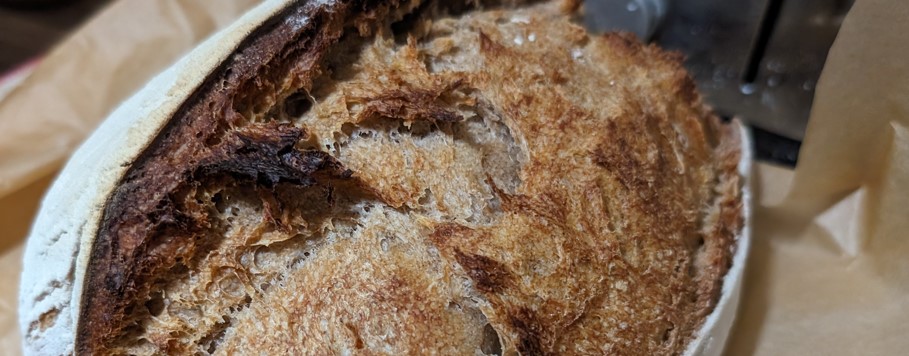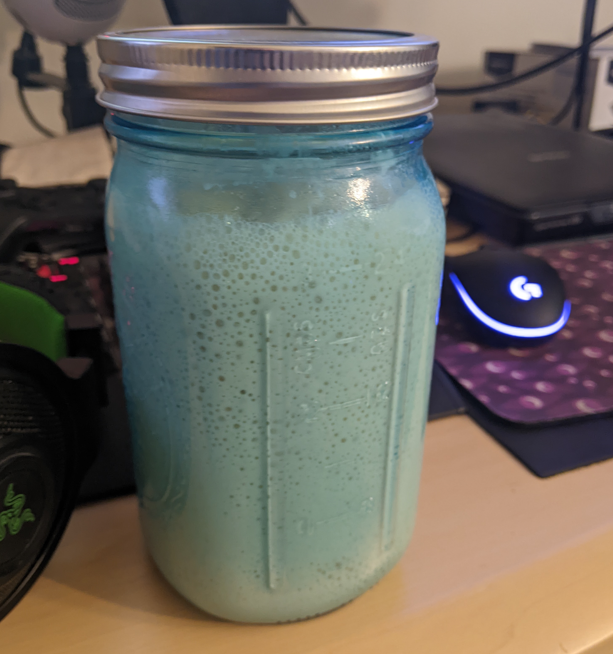
On Knowledge and Sourdough
On Knowledge and Sourdough
The following is a brief summation of the most basic Sourdough recipe I know. It is adapted from the New York Times recipe and makes two loaves. Spoiler: It's 70% hydration with 20% starter.
Day 1: Feed your starter, so that you have at least 200g of substance. Leave it in a warm place overnight.
Day 2: Mix 750g white bread flour, 250g whole wheat flour, and 700g warm water. Autolyze for 30+ minutes. Mix in 200g of levan (that starter you made). Mix in 10g water and 10g salt. Knead the dough through stretch and fold. Monitor the dough, stretch and fold each time you interact with it until doubled (2 to 6 hours). Turn out onto a floured surface, split into two equal masses. Gently flatten, and pull the corners back together to make a rounded mound. Wait for 30 minutes to let rest, then flatten gently again. This time, stretch and pull across each end, then roll it up. Put into a well floured banneton, seal the top, and put in the fridge overnight.
Day 3: Preheat an oven as hot as it goes (usually 550 F) with a dutch oven in it. Turn out a banneton onto parchment paper, and with a food safe razor (called a lame in this context), cut at a 25 degree angle from the hypothetical plane you would need to cut to make to the top of the loaf to make it flat. Put the assembly into the dutch oven and put that into the oven. Turn off the oven (yes, you read that right). Wait for 10 minutes, remove the dutch oven lid, and turn the oven to 450 F. Watch until browned to preference (usually about 30 minutes).
As baking recipes go, it's kind of complex, so here, have a video.
Here's the thing: you still don't know how to make sourdough.
Learning to Cook
"Knowing how to Cook" is knowing the unsaid expectations of food. Food has a Goldilocks zone that it needs to exist in, and there is an island in that zone where that food can taste good.
People who say that cooking is "following a recipe" are 30% right, but there is a lot of jargon and assumptions involved. "Flour" is probably AP flour, "Sugar" is probably granulated white sugar, there is no such thing as non-stick when it comes to cakes, brushing egg on bread is what makes it brown in the oven.
How does one learn knowledge over information? It sure as fuck isn't reading books, or at least, not directly. It takes a lot of iteration, record keeping, and experimentation to figure out if something is worth a damn.
This is true of all knowledge, but it is personally observable in the realm of cooking. Do not take what I have to give here as knowledge, but information that you may transform into knowledge one day.
I can't teach you how to make sourdough, but I can show my journey, and maybe you can figure out a process to know on your own.
This Bread isn't Going to Raise Itself
All sourdough needs starter. It is the wild yeast that all of this process hinges. I started after the COVID Sourdough craze, having got into baking confections and regular white bread.
Tips
I can't teach sourdough but if I can do it again these are things I can do different.
So here's something to chew on: don't learn to bake bread on sourdough. Bake some regular white bread first, with regular yeast. Know what that looks like. Know proofed dough feels like. Know what oil does, know why over-proofed bread is bad, and most importantly, know what you are getting to is work.
Anyway, getting sourdough starter is a process. At worst, it can take something like a month before the starter acts the way you expect, that is, doubling in size. You need it to do so in about 8 hours, otherwise the yeast will chew through the flour before sufficient rise occurs.
But... what is the recipe for sourdough starter? All recipes will give it lip-service, but the specifics (if even provided) will vary wildly. One recipe I saw involved mixing a 60% hydration mix with with 100g bread flour every six hours. It was advised that half of the mix be discarded every time too. Other's are more permissive, such as this Adam Ragusea video about sourdough.
Adam suggests something like "whatever fits in half the jar, changed every week or so," which is a little closer to what I do.
Let me tell you, I tried all sorts of things over the course of a month. I was having no luck, very little rise, and just a sour liquid at the top of the mix.
My breakthrough was twofold.
Sourdough Academy
Did you know Sourdough YouTube is a thing? It shouldn't surprise anyone, if you can be obsessed, there is someone who can be co-obsessed. I guess I'm more surprised about its specificity, but I digress.
I had a playlist of Sourdough-Tube going while I was doing... whatever I do on the computer, when this guy came on. This video, in fact.
This video is long. Don't watch it all. The nugget you need to know is that he suggests that sourdough starter should be less than 90% hydration so it is stiff. The comparison (this is important!) is that you should be able to turn it over like a DQ Blizzard with confidence. This achieves two things:
- starter liquefies over time, so it provides good contrast with how it winds up.
- With it stiffer, it has structure with which to rise, like bread.
This is good advice! But it is surrounded by less good information. An hour of it.
Tips
Sourdough Academy, if you are reading this, you're cool. But it is my opinion that your videos could be edited down to like, 10 minutes.
My Cold, Cold Heart is Hostile to Bread's Warmth
I keep my apartment pretty cold at all times; I run pretty hot, and run like three computers in a tiny room, what can I say.
Unfortunately, that makes my apartment a giant shitty refrigerator, which is not great for wild yeast.
Tips
Be a lizard. Heat lamp. But not for sourdough, it’ll dry out or mold.
I don't know when I realized this might be a problem (Maybe it is because EVERY SINGLE SOURCE MENTIONS A WARM LOCATION), but it still presented a problem of where a warm place in my frozen habitat.
What about... on top of my 'spensive computer?
Warning
DON'T FUCKING DO THIS
The crazy part is this WORKED.

After a few days my starter would threaten to escape the little ball jars I used to keep my cultures.
I guess the lesson here is that patience isn't always a virtue. For slow things like this, have a threshold for time that you are willing to wait. To my credit, this was an attempt to limit how many variables were changing, but to my discredit, I have a rack of ball jars that would have let me try a bunch of variables all at once.
Anyways, one day I'll talk about the rest of the journey, my disastrous first loaf, and where I'm at now.
